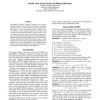Free Online Productivity Tools
i2Speak
i2Symbol
i2OCR
iTex2Img
iWeb2Print
iWeb2Shot
i2Type
iPdf2Split
iPdf2Merge
i2Bopomofo
i2Arabic
i2Style
i2Image
i2PDF
iLatex2Rtf
Sci2ools
118
click to vote
AAAI
2008
2008
Interaction Structure and Dimensionality Reduction in Decentralized MDPs
Decentralized Markov Decision Processes are a powerful general model of decentralized, cooperative multi-agent problem solving. The high complexity of the general problem leads to a focus on restricted models. While worstcase hardness of such reduced problems is often better, less is known about the actual difficulty of given instances. We show tight connections between the structure of agent interactions and the essential dimensionality of various problems. Bounds are placed on problem difficulty, given restrictions on the type and number of interactions between agents. These bounds arise from a bilinear programming formulation of the problem; from such a formulation, a more compact reduced form can be automatically generated, and the original problem rewritten to take advantage of the reduction.
AAAI 2008 | Cooperative Multi-agent Problem | General Problem | Intelligent Agents | Problem Difficulty |
Related Content
| Added | 02 Oct 2010 |
| Updated | 02 Oct 2010 |
| Type | Conference |
| Year | 2008 |
| Where | AAAI |
| Authors | Martin Allen, Marek Petrik, Shlomo Zilberstein |
Comments (0)

